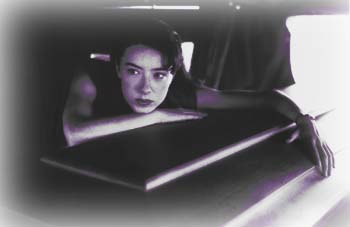![[Metroactive Movies]](/movies/gifs/movies468.gif)
![[Metroactive Movies]](/movies/gifs/movies468.gif)
[ Movies Index | Metro | Metroactive Central | Archives ]
Stiff Upper Lovers
 Kharen Hill Casket Calling: Sandra (Molly Parker) has an unsettling fondness for the contents of coffins. A young woman pursues her desires in 'Kissed' THE MAJORITY of necrophiliacs are half-bright middle-aged men; female cases are rare. Maybe that very rareness makes a story about a woman who loves the dead less disgusting, almost a daydream. This sense of oddity is what gives distance to Kissed, an unusually tender film by Canada's Lynne Stopkewich. Kissed is as unpretentious as can be, even though it takes place in a genre known for melodrama, pain and masochism. I don't mean horror movies--I mean feminist coming-of-age films. Sandra is kind of a ghoul, but she's also a virginal heroine trying to puzzle out her sexuality. The young Sandra (Natasha Morley) was not traumatized into necrophilia; she was just fascinated by death. As a child, she was a pallbearer for dead birds and rodents, holding funerals in the woods and marking graves with popsicle-stick crosses. Furthering her interests, the grownup Sandra (Molly Parker) gets a job in a funeral home, ready to place herself under the guidance of an older man. The pock-marked, suitably grave mortician, Mr. Wallis (Jay Brazeau), impresses her with his quiet authority. She mistakes his seriousness for a passion like her own. The scenes of Wallis as he trains Sandra work as an inspired metaphor for bad first-time sex. Sandra's disappointment is obvious as she watches Wallis prepare a body. She had no idea how cold and unpleasant the experience was going to be--and Wallis flourishes his equipment, just like a man. The undertaker produces a long metal tube that sucks fluids. "Trocar!" he announces proudly. "Sometimes called the Undertaker's Sword!" Sandra is distracted by the noisy embalming machines and by the country & western music that Wallis insists on listening to during the act. She's repelled by the little rubber things he uses to prop up the face of a "Loved One" and the way he makes insensitive comments--"Well, at least you didn't faint. That's a good thing." Later, Sandra is left alone at night with the stiffs so that she can perform her personal ritual: a body-on-body massage. In the daytime, Sandra takes an anatomy class as part of her training as a mortician. Eventually, she meets a live one she likes, a premed student named Matt (Peter Outerbridge, who looks like the young Peter O'Toole). Matt understands Sandra, doesn't judge her, tries to develop some interest in the only thing that really turns her on. "I can be dead for you," he says, desperately. Their lovemaking is OK--"nice"--but it's not as intense as what Sandra feels when she's with the deceased. A live Matt is too unthreatening compared to the dead young men she prefers. The sensitive guy knows this and is eager to do something, anything, to attract Sandra's full attention and love.
Richard von Busack interviews Lynne Stopkewich, The official movie home page.
THE ACTION is set in the 1970s, a now-unimaginable era of sexual exploration that gives some logic to the fantasy, and the low, low budget is belied by a convincing but unobtrusive polyester look. With delicacy but urgency, Kissed cuts away from the rougher details, blossoming into a blank screen for the "going for the light" near-death experience. The film is strong-minded for its softness, and the combination of gentleness and pointedness is embodied in Parker. She has the peculiarly attractive intensity of the young Joni Mitchell. She looks smart, and as it's said, intelligence is the greatest aphrodisiac. Kissed is based on a short story by Barbara Gowdy, "We So Seldom Look on Love," that Stopkewich discovered in an anthology of women's erotica. Reading such collections can be surprising; it's strange to see such openness mixed with such subtlety. Explicit mainstream porn and Adrian Lynestyle erotica (9 1/2 Weeks), on the other hand, are mirrored in feminist victimization stories such as Looking for Mr. Goodbar and The Accused. The message in both cases is always plain: Women who go out looking for passion might get a lot more than they bargained for. Even the feminist erotica of Mira Nair's Kama Sutra is buffered with a moral: Too much physical pleasure could lose you your kingdom. Kissed is probably the first movie since 1987's Wish You Were Here to follow--with such little hesitation--a woman's search for what turns her on. And like Wish You Were Here, Kissed isn't a princess fantasy. Society (i.e., men) isn't to blame for Sandra's occasional ruthlessness or for the fact that the only boys who can make her see stars are dead. Sandra makes her own decisions and takes responsibility for her wants. Kissed is feminist, and feminist in a way that you almost never see on screen.
Kissed (R; 78 min.), directed by Lynne Stopkewich, written by Stopkewich and Angus Fraser, based on a story by Barbara Gowdy, photographed by Gregory Middleton and starring Molly Parker and Peter Outerbridge. [ Metro | Metroactive Central | Archives ]
| ||||||||||||||||||||||||||||||
This page was designed and created by the Boulevards team.
Copyright © 1997 Metro Publishing, Inc.